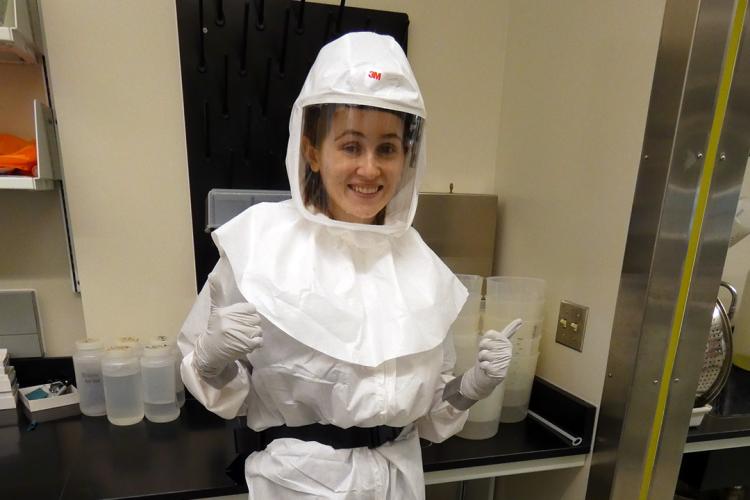
A Master of Science student specializing in virology, Marin Habbick is exploring how the chemical messages sent through different sex hormones may affect the severity of illness caused by three dangerous human coronaviruses. (Photo: Stephanie L Saundh /courtesy of USask)
Is the feared "man cold" real?
That's the question at the heart of Marin Habbick's research. A Master of Science student specializing in virology, Habbick is exploring how the chemical messages sent through different sex hormones may affect the severity of illness caused by three dangerous human coronaviruses.
"It has been observed that male persons are more likely to get infected and become seriously ill when exposed to these coronaviruses, but it is unknown why they suffer greater disease compared to female persons," she said.
This new project will form the core of Habbick's MSc research and potentially determine whether the infamous "man cold" is, in fact, a real condition.
Habbick's research is conducted at the Vaccine and Infections Disease Organization (VIDO) at USask under the supervision of virologist Dr. Angela Rasmussen (PhD). She lauded the expertise and facilities at VIDO for being one of the only places in the country where she could hope to take on this kind of intensive post-graduate research.
"VIDO-InterVac is a world-class virus research facility, and a central hub of scientific excellence," Habbick said. "The concentration of talent offers a great opportunity for an early-career scientist like myself to learn and grow."
The main thrust of Habbick's research is centred around three well-known human coronaviruses: SARS-CoV-1 (severe acute respiratory syndrome), MERS-CoV (Middle East respiratory syndrome) and SARS-CoV-2 - better known as the virus responsible for the COVID-19 pandemic.
By using cells in petri dishes that have been treated with hormones like estrogen and testosterone and exposing them to the different coronaviruses, Habbick hopes to be able to determine if and how those hormones alter the severity of the viruses.
While still in the early stages of the project, Habbick said their initial tests have held promising results connecting sex hormones to the efficacy of the coronaviruses being tested. As she puts it, this research can add "another piece in the virology puzzle" to help predict and prevent infection for those at the most risk.
"Some risk factors that increase your likelihood of severe disease are well known, like old age and certain comorbidities," Habbick said. "However, we still don't fully understand why some infected people get really sick while others do not."
Habbick's unique research has already led her to public success and acclaim. Her presentation at the 2024 USask Three Minute Thesis (3MT) competition earned her first place among her peers.
The inspiration for this research came from the COVID-19 pandemic. Habbick said it was "alarming" to see how devastating COVID-19 was for even seemingly healthy individuals, and pushed Habbick to focus her research on a project that could benefit the average person and their potential health outcomes.
As research moves forward following COVID-19, Habbick hopes she can be part of the next group of contributors to make a difference in virus research and pandemic prevention.
"The COVID-19 pandemic has taught us many valuable lessons, particularly the importance of identifying those most susceptible to severe illness," Habbick said. "I hope that this research will enhance our readiness for the emergence of future coronaviruses."












